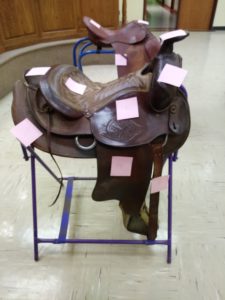Main Content

Do you need a hands-on, fun activity for your next horse club meeting? Why not try a learning game that helps your members remember the types of saddles and their parts? To set up the game, all you need is a few basic materials and several different types of saddles. To start, collect the following items; Post-It Notes®, pens and pencils, scrap paper, saddles, and saddle stands. Recommended saddles would include; Western Show Saddle, English All Purpose Saddle, Dressage Saddle, etc. Set saddles on saddle stands. Next, take the Post-It Notes® and place a number on each note using your pen or pencil (1, 2, 3, 4, ….). Place each Post-It Note® on a distinct part of each saddle. During your activity time, have club members write the matching saddle part to each numbered note on the saddles. Review and discuss answers.
Variations of the game could include; having members number and place the Post-It Notes® on each saddle and then reviewing together what was correct and what was missed; putting club members in teams and having them race to see which group can label the parts of the saddle the fastest and/or using a timer to see who can finish first.
Activities like this can help members who are visual learners, encourage teamwork and cooperation, and teach problem solving skills. These are all important factors that will help your club at your next equine science event
Materials:
• Post-It Notes®
• Pens or Pencils
• Scrap paper (for members to place their answers on)
• Saddles (several different types: English, Western, Dressage, etc.)
• Optional: Saddle stands for each saddle
• Resources to use to confirm answers/questions
Tips:
• Need saddles? Have each club member bring their own saddle and saddle stand if they have one. If you do this, why not pair this activity with learning about how to care for your saddle and then have a tack cleaning party.
• Why not hand-out a reference or resource sheet for your club members resource binder. There are many images of the different types of saddles and their parts online. This could be used as a quick reference at the next equine science event.
Resources and Links:
• Types of Western Saddles
This is a great resource from Horse.com on the different types of western saddles.
• Different Types of Saddles
This resource is a short video about several different types of saddles. It explains how they are different and when you might use each type of saddle.
• All Around Saddles
This resource is a link to a Pinterest page that has everything you would want to know about different types of saddles.
• Eastern National 4-H Round Up Supplemental References: The Dover Saddlery English Tack Catalog and Smith Brothers Western Tack Catalog may be used as supplemental references. These catalogs provide visual representations for questions relating to tack.
Dover Saddlery – Apparel, tack and horse care items for the English rider. To request a free catalog please visit www.DoverSaddlery.com or call toll free 1 888 234 6942.
Smith Brothers – Apparel, tack and horse care items for the Western rider. To request a free catalog please visit www.SmithBrothers.com or toll free 1- 888 677 0450.
Written By Mary Howard, Gloucester County 4-H Volunteer and Carol K Ward, County 4-H Agent, Rutgers Cooperative Extension